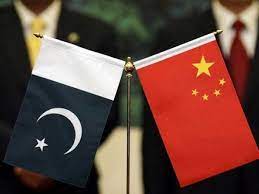Iron Brother China has helped out of the way as Pakistan fights COVID-19: PM’s aide

Islamabad: Iron Brother China has gone out of way in keeping up a supply chain and transferring technology as Pakistan fights the COVID-19, a close aide of Prime Minister Imran Khan said.
Speaking at a news conference here, Special Assistant to Prime Minister on National Health Services, Regulations, and Coordination Dr Faisal Sultan said China was a strong partner and proved to be a true friend.
Pakistan, he said, will begin producing the single-dose Chinese CanSino Bio vaccine locally to become largely self-sufficient in meeting its COVID-19 demand.
Dr Faisal Sultan announced that Pakistan will become largely self-sufficient in meeting its COVID-19 vaccine needs with the production.
He said that the Economic Coordination Committee approved $150 million dollars for vaccine procurement on November 20, 2020, while the Cabinet confirmed this on December 1, 2020.
Sultan said that it was important to note that vaccines did not get approved for use until mid or late December as Pfizer approved on December 11, 2020, AstraZeneca approved on December 30, 2020, while Sinopharm was also in late-stage Phase III trials in December.
He said that manufacturers like Astra Zeneca and Moderna have been unable to meet demand while some of the world’s largest vaccine manufacturing countries have imposed embargos on exporting vaccines until their local demand is met.
Sultan said that the government is proud of its accomplishments especially considering the serious global supply issue when some of the richest countries like Australia and Canada had to slow down or halt their vaccine roll-out.
He said that it is erroneous to compare Pakistan with countries like the US and India who are self-sufficient in vaccine production already. “We are certainly moving in that direction now but so far Pakistan did not have the capacity for vaccine production.”
Sultan said due to the agreement on technology transfer, the National Institute of Health (NIH) will be able to produce three million doses per month which will significantly reduce the country’s dependence on other countries.
He said the government had planned to vaccinate 70 million population by the end of the year 2021. He said the population of Pakistan which was currently eligible for vaccination was 100 million out of 220 million as the vaccines had only been approved for those above 18.
He added for the first half of the year, January to June 2021, the government had received and expected to receive 19.82 million doses. He added 91% of these doses were purchased, which clearly shows we were not dependent on donations.
Dr Faisal Sultan said in totality, “we have signed deals for over 30 million doses already so the fact that we have already secured 30 million doses and will continue to procure more the rest of the year should be very reassuring.”
He said that Pakistan was now vaccinating nearly 150,000 people daily while the target was to reach 300,000 vaccinations daily in the country.
He said that the government has started vaccination for 40 years and above and in this regard, the registration was opened last week.
Dr Faisal Sultan said: “Our procurement is a result of proactive efforts. The government initiated the conversation with vaccine manufacturers and GAVI in July 2020 which is well before any vaccine had been fully developed and approved.”
He made it clear that Pakistan’s vaccine roll-out began very soon after India’s as the first vaccine dose was administered in India on the 16th of January while the first vaccine dose was administered in Pakistan on the February 2.
He said that some have drawn comparisons to countries in the region with smaller economies like Bhutan which has vaccinated over 60% of its population. He added Bhutan has a population of almost 750,000 which means they have vaccinated around 500,000 people.
Dr Faisal Sultan said that Pakistan had a population of 220 million and we have vaccinated over 2.5 million people. So Pakistan has vaccinated five times as many people as Bhutan actually and, in fact, three times the whole population of Bhutan.”
He said the government will continue to take additional precautions of limiting public space and enforcing Standard Operating Procedures (SOPs) to slow down the spread of disease.
He expressed the hope the media will continue to support the government wholeheartedly in the fight against COVID.





